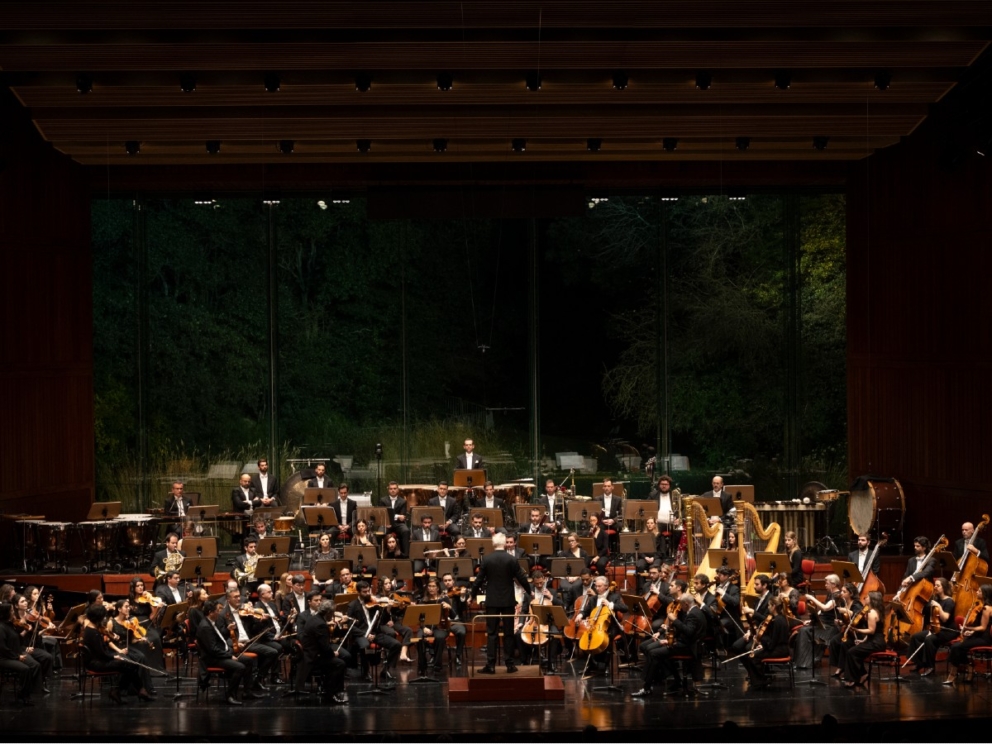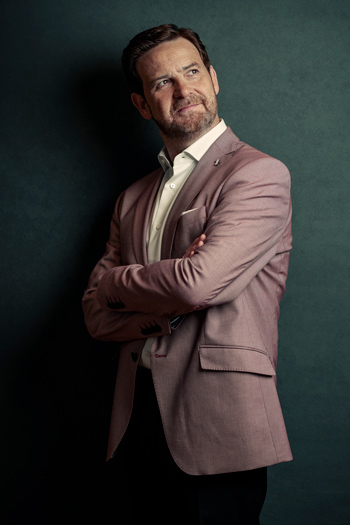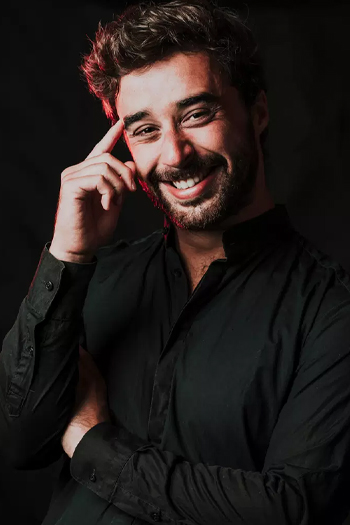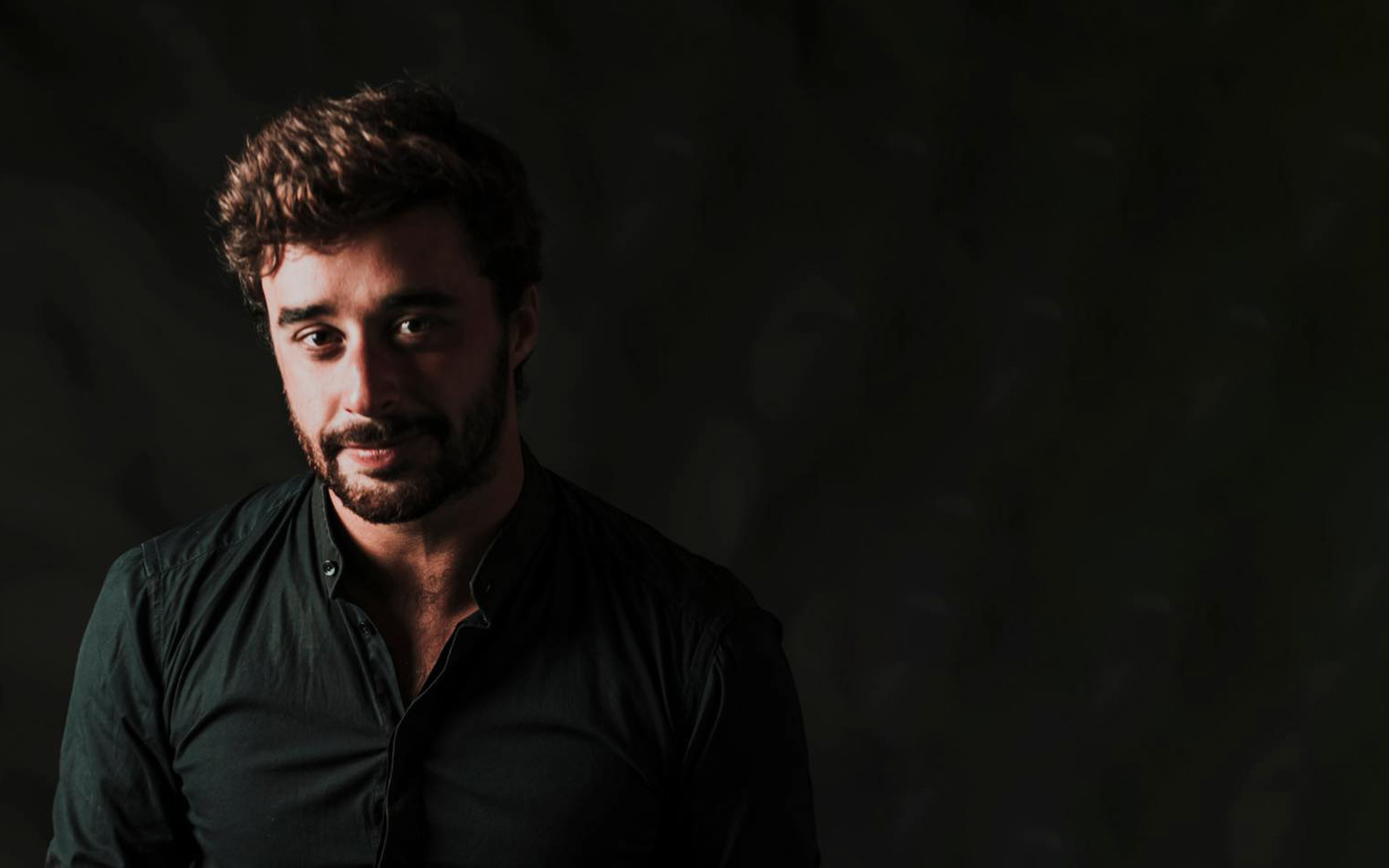Mozart's Piano Concerto No. 27
Gulbenkian Orchestra / Álvaro Albiach / Raúl da Costa
Event Slider
Date
- / Cancelled / Sold out
Location
Grand Auditorium Calouste Gulbenkian FoundationThis concert will broadcast live here on 10 March at 19:00.
Pricing
50% – Under 30 years old
15% – Over 65 years old
- Conductor
- Piano
-

Gulbenkian Orchestra
In 1962, the Calouste Gulbenkian Foundation decided to establish a permanent orchestral ensemble. Originally with only twelve musicians (strings and continuo) it was named “Orquestra de Câmara Gulbenkian”. This collective was successively enlarged and today the “Orquestra Gulbenkian” (the name it has adopted since 1971) has a permanent body of sixty instrumentalists, a number that can be expanded depending on the repertoire.
This structure allows the Gulbenkian Orchestra to interpret works from the Baroque and Classical periods, a significant part of 19th century orchestral literature and much of the music of the 20th century, including works belonging to the current repertoire of the traditional symphonic orchestras. In each season, the orchestra performs on a regular series of concerts at the Gulbenkian Grand Auditorium in Lisbon, where it has had the opportunity of working together with some of leading names of the world of music (conductors and soloists). It has also performed on numerous locations all over Portugal, in an effort to decentralize music and culture.
The orchestra has been constantly expanding its activities in the international level, performing in Europe, Asia Africa, and the Americas. In the recording field, Orquestra Gulbenkian is associated to labels as Philips, Deutsche Grammophon, Hyperion, Teldec, Erato, Adès, Nimbus, Lyrinx, Naïve and Pentatone, among others, and this activity was recognized with several international prizes.
-

Álvaro Albiach
Conductor
Álvaro Albiach’s musical career started when he won the Grand Prize of the Jury and the audience award of Besançon’s International Contest in 1999. From there on he took on an intense activity with invitations from orchestras such as the Wiener Kamme- rorchester, NDR Radio Philharmonie de Hannover, Würtembergische Philharmonie, Staatskapelle Halle, Trondheim Symphony, Orchestre d’Auvergne, Nacional de Lyon, or the Philharmonic of Bogotá, as well as the main Spanish orchestras (ONE, ORTVE, the symphonic orchestras from Galicia, Barcelona, Comunidad Valenciana, the Orquesta de València, JONDE, etc.).
From 2012 to 2021 he has been the titular and artistic conductor of the orchestra of Extremadura. There he has engaged in an intense concert activity and of projection of the group, recognized by the public and the press, some highlights of which are the opera performances in the Merida Festival, the concerts in the Auditorio Nacional de Música, as well of the orchestra’s first recording for SONNY Classical of the work of José Zárate.
He combines the concert [esto no tiene mucho sentido] with an important presence in operas. He has worked with theaters such as the Real of Madrid, the Gran Teatre of Barcelona’s Liceu, Pesaro’s Festival Rossini, Bologna’s Teatro Comunale, Schleswig Holstein Festival, Granada’s and Peralada’s festivals, Oviedo’s Teatro Campoamor or Zarzuela’s, as well as many others. He has also collaborated with Spain’s National Ballet in Madrid and in Les Arts.
-

Raúl da Costa
Piano
Born in 1993, Raúl da Costa started his musical studies at the age of seven in his hometown's Music School, where he first studied piano with Professor Luis Amaro and then with Emília Coelho. From 2006 to 2011, he studied in Academia de Música S. Pio X in Vila do Conde, Portugal, with Professor Álvaro Teixeira Lopes.
Raúl da Costa is a regular guest at the most prestigious halls in Portugal and in various Festivals throughout Europe. With a vast repertoire from Bach to Zimmermann, chamber music has represented a main point in Raúl’s career, especially the collaboration with Christoph Poppen, Juliane Banse, Bruno Monsaingeon and Matvey Demin. He made his orchestral debut at the age of 12 in Casa da Música, Porto, and has since then played under the baton of Stefan Blunier, Antonio Pirolli, Theodore Kuchar, Joseph Swensen, Martin Andre, Vladimir Lande and with various orchestras such as the Porto Symphony Orchestra, the Janacek Philharmonic Orchestra, the Siberian State Symphony Orchestra, or the Antaliya Symphony Orchestra.
Raúl is the 1st Prize winner of the various international piano competitions, including the San Sebastian International Piano Competition, the Scriabin International Competition in Paris and in the Young Pianist of the North International Piano Competition in Newcastle. He was a prize-winner of the 1st European Union Piano Competition in Prague (representing Portugal) with only 16 years of age. In 2016, Raúl won the 1st Prize and unanimously the public prizes at the ZF Musikpreis International Award. Raúl is a scholar of the renowned Yamaha Music Foundation of Europe, the Yehudi Menuhin Live Music Now Foundation, and of the Gulbenkian Foundation in Lisbon.
He has made live recordings for both Portuguese and foreign Radio and Television, such as for the Deutschlandradio, NDR, SWR radios in Germany, or Radio France. His live recording of Rachmaninoff’s 4th Piano Concerto with Porto Symphony Orchestra and Stefan Blunier was released on CD.
Raúl profited of the work with distinguished artists such as Maria João Pires, Ferenc Rados, Dmitri Bashkirov, Ferenc Rados, Karl-Heinz Kämmerling, Boris Berezovsky, Roger Muraro and Tatiana Zelikman.
Raúl studied in the Hochschule für Musik, Medien und Drama in Hannover, where he was part of the class of the renowned Professor Karl-Heinz Kämmerling and Prof. Bernd Goetzke. Currently, he is studying with Kirill Gerstein in the Hochschule für Musik Hanns Eisler, Berlin. In 2018 he was appointed Artistic Director of the Póvoa de Varzim International Music Festival.
Wolfgang Amadeus Mozart
Don Giovanni – Overture
Piano Concerto No. 27, in B-flat major, K. 595
— Intermission 20 min —
Wolfgang Amadeus Mozart
Symphony No. 40, in G minor, K. 550
In the summer of 1788, when composing his final three symphonies – a few months after the premiere of the opera Don Giovanni – Mozart reserved a more sombre, melancholic and tense mood for his Symphony No. 40 than usual, creating more of a Romantic emotional style. Though the urgency of this composition surprised his peers, the magnificence of the work was recognised by Schumann, who described it as “full of Hellenic gracefulness”. With Raúl da Costa performing Piano Concerto No. 27, the Gulbenkian Orchestra will dive into the stimulating last years of Mozart’s creative life.
Sponsor Gulbenkian Music
Sponsor Gulbenkian Orchestra
Sponsor Piano Concertos
The Calouste Gulbenkian Foundation reserves the right to collect and keep records of images, sounds and voice for the diffusion and preservation of the memory of its cultural and artistic activity. For further information, please contact us through the Information Request form.
